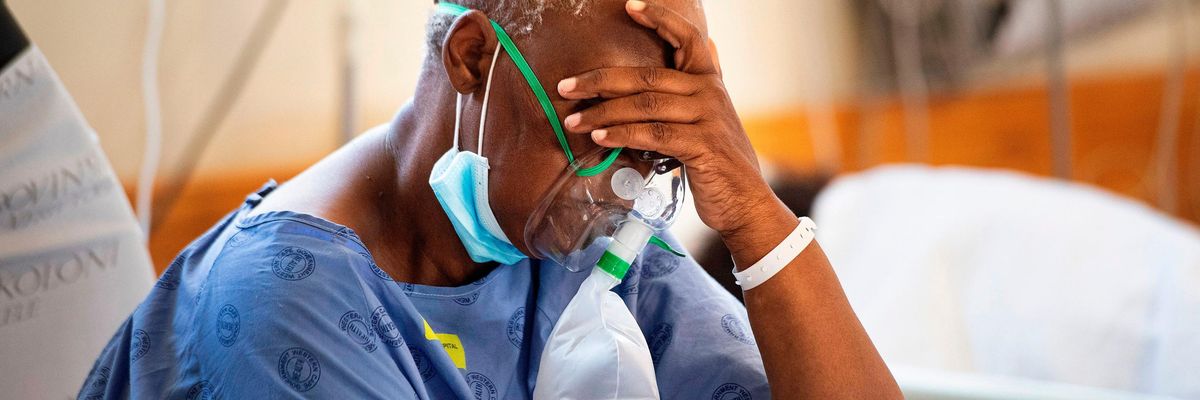
A patient with Covid-19 breaths in oxygen in the coronavirus ward at Khayelitsha Hospital outside of Cape Town, South Africa. (Photo: Rodger Bosch/AFP via Getty Images)
First US Omicron Case Confirmed as WHO Chief Decries Failure to Share Vaccines Globally
Factors including low vaccine coverage have created "a recipe for breeding and amplifying variants," the top health official said.
The same day U.S. officials announced the first confirmed case of Omicron coronavirus variant detected in the country, the head of the World Health Organization lamented that nations had created a "toxic mix" fueling conditions favorable to the virus' spread, including vastly unequal access to Covid-19 vaccines.
WHO chief Tedros Adhanom Ghebreyesus' comments Wednesday came as he welcomed member states having reached an agreement to begin the lengthy process of drafting a new convention or international agreement on preventing a future pandemic and also urged continued vigilance against the highly transmissible Delta variant, which is dominating global cases.
The fact that Omicron has now been reported in at least 23 countries, said Tedros, "should not surprise us. This is what viruses do."
"And," he continued, "it's what this virus will continue to do, as we long as we allow it to continue spreading."
Tedros praised "Botswana and South Africa for detecting, sequencing and reporting this variant so rapidly." He called it "deeply concerning to me that those countries are now being penalized by others for doing the right thing."
While "rational, proportional risk-reduction measures" are warranted, Tedros rejected "blanket travel bans" as a measure to stop Omicron's spread, saying they "place a heavy burden on lives and livelihoods."
The U.S. imposed travel restrictions on eight countries, including Botswana and South Africa, this week in response to the new variant. Other nations have taken similar measures, as well, sparking criticism from South African Health Minister Joe Phaahla, who said nations were "finding scapegoats to deal with what is a worldwide problem."
Related Content

'Time for Debate... Is Over': Sanders Demands WTO Approve Vaccine Patent Waiver
Tedros, in his comments, had a similar message as grassroots vaccine equity campaigners in putting blame for the new mutations on the stark difference between rich and poor nations in access to vaccines and other Covid-19 related tools--a gap the activists say proves the need for adopting a stonewalled waiver at the World Trade Organization for coronavirus vaccine patents.
"Globally," he said, "we have a toxic mix of low vaccine coverage, and very low testing--a recipe for breeding and amplifying variants."
According to Our World in Data, 54.5% of the world population has received at least one dose of a Covid-19 vaccine. In low-income countries, however, the figure stands at just 6%.
On Wednesday the Centers for Disease Control and Prevention said that the California and San Francisco Departments of Public Health confirmed an Omicron variant case of the virus, the first time the variant has been detected in the U.S.
The individual, who is vaccinated and had mild symptoms, returned from travel to South Africa on November 22, the agency said.
An Urgent Message From Our Co-Founder
Dear Common Dreams reader, The U.S. is on a fast track to authoritarianism like nothing I've ever seen. Meanwhile, corporate news outlets are utterly capitulating to Trump, twisting their coverage to avoid drawing his ire while lining up to stuff cash in his pockets. That's why I believe that Common Dreams is doing the best and most consequential reporting that we've ever done. Our small but mighty team is a progressive reporting powerhouse, covering the news every day that the corporate media never will. Our mission has always been simple: To inform. To inspire. And to ignite change for the common good. Now here's the key piece that I want all our readers to understand: None of this would be possible without your financial support. That's not just some fundraising cliche. It's the absolute and literal truth. We don't accept corporate advertising and never will. We don't have a paywall because we don't think people should be blocked from critical news based on their ability to pay. Everything we do is funded by the donations of readers like you. Will you donate now to help power the nonprofit, independent reporting of Common Dreams? Thank you for being a vital member of our community. Together, we can keep independent journalism alive when it’s needed most. - Craig Brown, Co-founder |
The same day U.S. officials announced the first confirmed case of Omicron coronavirus variant detected in the country, the head of the World Health Organization lamented that nations had created a "toxic mix" fueling conditions favorable to the virus' spread, including vastly unequal access to Covid-19 vaccines.
WHO chief Tedros Adhanom Ghebreyesus' comments Wednesday came as he welcomed member states having reached an agreement to begin the lengthy process of drafting a new convention or international agreement on preventing a future pandemic and also urged continued vigilance against the highly transmissible Delta variant, which is dominating global cases.
The fact that Omicron has now been reported in at least 23 countries, said Tedros, "should not surprise us. This is what viruses do."
"And," he continued, "it's what this virus will continue to do, as we long as we allow it to continue spreading."
Tedros praised "Botswana and South Africa for detecting, sequencing and reporting this variant so rapidly." He called it "deeply concerning to me that those countries are now being penalized by others for doing the right thing."
While "rational, proportional risk-reduction measures" are warranted, Tedros rejected "blanket travel bans" as a measure to stop Omicron's spread, saying they "place a heavy burden on lives and livelihoods."
The U.S. imposed travel restrictions on eight countries, including Botswana and South Africa, this week in response to the new variant. Other nations have taken similar measures, as well, sparking criticism from South African Health Minister Joe Phaahla, who said nations were "finding scapegoats to deal with what is a worldwide problem."
Related Content

'Time for Debate... Is Over': Sanders Demands WTO Approve Vaccine Patent Waiver
Tedros, in his comments, had a similar message as grassroots vaccine equity campaigners in putting blame for the new mutations on the stark difference between rich and poor nations in access to vaccines and other Covid-19 related tools--a gap the activists say proves the need for adopting a stonewalled waiver at the World Trade Organization for coronavirus vaccine patents.
"Globally," he said, "we have a toxic mix of low vaccine coverage, and very low testing--a recipe for breeding and amplifying variants."
According to Our World in Data, 54.5% of the world population has received at least one dose of a Covid-19 vaccine. In low-income countries, however, the figure stands at just 6%.
On Wednesday the Centers for Disease Control and Prevention said that the California and San Francisco Departments of Public Health confirmed an Omicron variant case of the virus, the first time the variant has been detected in the U.S.
The individual, who is vaccinated and had mild symptoms, returned from travel to South Africa on November 22, the agency said.
The same day U.S. officials announced the first confirmed case of Omicron coronavirus variant detected in the country, the head of the World Health Organization lamented that nations had created a "toxic mix" fueling conditions favorable to the virus' spread, including vastly unequal access to Covid-19 vaccines.
WHO chief Tedros Adhanom Ghebreyesus' comments Wednesday came as he welcomed member states having reached an agreement to begin the lengthy process of drafting a new convention or international agreement on preventing a future pandemic and also urged continued vigilance against the highly transmissible Delta variant, which is dominating global cases.
The fact that Omicron has now been reported in at least 23 countries, said Tedros, "should not surprise us. This is what viruses do."
"And," he continued, "it's what this virus will continue to do, as we long as we allow it to continue spreading."
Tedros praised "Botswana and South Africa for detecting, sequencing and reporting this variant so rapidly." He called it "deeply concerning to me that those countries are now being penalized by others for doing the right thing."
While "rational, proportional risk-reduction measures" are warranted, Tedros rejected "blanket travel bans" as a measure to stop Omicron's spread, saying they "place a heavy burden on lives and livelihoods."
The U.S. imposed travel restrictions on eight countries, including Botswana and South Africa, this week in response to the new variant. Other nations have taken similar measures, as well, sparking criticism from South African Health Minister Joe Phaahla, who said nations were "finding scapegoats to deal with what is a worldwide problem."
Related Content

'Time for Debate... Is Over': Sanders Demands WTO Approve Vaccine Patent Waiver
Tedros, in his comments, had a similar message as grassroots vaccine equity campaigners in putting blame for the new mutations on the stark difference between rich and poor nations in access to vaccines and other Covid-19 related tools--a gap the activists say proves the need for adopting a stonewalled waiver at the World Trade Organization for coronavirus vaccine patents.
"Globally," he said, "we have a toxic mix of low vaccine coverage, and very low testing--a recipe for breeding and amplifying variants."
According to Our World in Data, 54.5% of the world population has received at least one dose of a Covid-19 vaccine. In low-income countries, however, the figure stands at just 6%.
On Wednesday the Centers for Disease Control and Prevention said that the California and San Francisco Departments of Public Health confirmed an Omicron variant case of the virus, the first time the variant has been detected in the U.S.
The individual, who is vaccinated and had mild symptoms, returned from travel to South Africa on November 22, the agency said.

